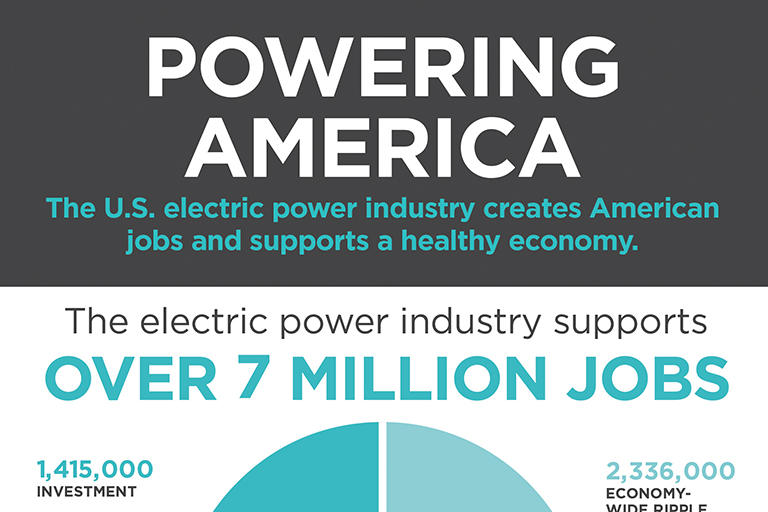By Paul Wessslund
If you want to work where the action is, how about a job as an electric lineworker, keeping the electricity flowing throughout your community? Or as a power use supervisor or member services representative, working with co-op members to find ways to reduce their electric bills by saving energy, utilizing renewable energy sources and making practical repairs around the home?
“The electric power industry is one of the great American success stories and provides high-quality jobs that empower our nation’s economic growth. Behind every wall outlet or light switch, there is a dedicated workforce focused on powering the lives of millions of Americans who rely on electricity for nearly everything they do,” said Michael J. Bradley, president and founder of M.J. Bradley & Associates that recently conducted the study “Powering America: The Economic and Workforce Contributions of the U.S. Electric Power Industry.”
The National Rural Electric Cooperative Association sponsored that study along with two other national utility groups to show how electric utilities power the economy as a result of lighting our homes and businesses.
A HIGH INVESTMENT IN INFRASTRUCTURE
“Powering America” cites the utility industry as the most capital-intensive economic sector, investing more than $100 million per year on the nation’s electricity infrastructure with advances in technology, environmental protections and other improvements. That’s in addition to money spent on regular operations and maintenance.
All that adds up to supporting more than 7 million jobs. More than 2.6 million of those jobs result from direct employment, like utility employees and contractors. As all those people go to work and live their lives, they create another 4.4 million “induced jobs,” such as teachers, doctors, real estate agents and service workers.
The report calculates the economic impact of the electric power industry at $880 billion, about 5 percent of the nation’s $18 trillion gross domestic product. The U.S. Department of Energy slices and dices those numbers a different way, shedding a little more light on wind turbine technicians and other renewable energy jobs.
The DOE’s second annual “United States Energy and Employment Report” released in January views energy jobs more broadly than just electric utilities. It includes careers in energy efficiency, mining and transportation, and concluded, “Rebuilding our energy infrastructure and modernizing the grid, diversifying our energy mix and reducing our energy consumption in both our built environment and motor vehicles, America’s labor markets are being revitalized by our new energy and transportation technologies.”
Wind power jobs may be growing rapidly, but the DOE report listed solar energy jobs as the largest share of people working on all types of electricity generation. Almost 374,000 people are working in solar power — 43 percent of the electricity generation workforce. Wind employs about 100,000 people.
CO-OPS LOOK OUT FOR THE COMMUNITY
Those renewable energy jobs are in addition to a raft of other careers in energy, from mining to energy efficiency, power plant operators and social media and cyber security specialists. Jobs at electric co-ops especially offer openings in cutting-edge careers, said Michelle Rostom, director of workforce development for NRECA.
Lineworkers are always in high demand. Every year, Colorado’s electric cooperatives award scholarship opportunities to those looking into a career in linework. In 2017, a combined total of $384,000 in scholarships was awarded by several co-ops along with power suppliers Tri-State Generation and Transmission Association, based in Westminster, and Basin Electric Power Cooperative, headquartered in Bismarck, North Dakota.
“There are a lot of great opportunities at co-ops,” Rostom said, noting that electric co-ops expect to hire as many as 25,000 new employees in the next five years. “Electric co-ops are doing a lot of research on integrating solar power and wind with coal and other cutting-edge solutions. There are opportunities to be part of the next generation of the energy industry.”
Part of the reason those jobs will be available is that the large baby boomer generation is retiring — Rostom said 6,000 co-op employees retired last year. Other parts of the energy industry went through that wave of retirements several years ago, but Rostom said it’s just catching up with electric co-ops. “People stay at the co-op for so long because they’re great jobs with interesting work, a chance to grow professionally in a lot of different areas and they have a strong connection with their local communities,” she said.
Electric co-ops formally addressed that need to hire more talent when NRECA set its six strategic objectives, one of which is to develop the “Next Generation Workforce.” In 2006, NRECA joined with other national groups to form the Center for Energy Workforce Development as a way of making sure jobs get filled with high-quality workers.
NRECA sees military veterans as part of the solution and began the “Serve Our Co-ops; Serve Our Country” veterans hiring initiative, which is another part of Rostom’s job as coordinator.
“Veterans have always been a core part of our co-op workforce and this program creates additional intent to hire more veterans,” she said. “Veterans are mission-oriented, disciplined and safety-focused. They show strong leadership capabilities and they work well under pressure.
“There are a lot of parallels between the military and cooperative principles, like teamwork, autonomy, independence and community,” Rostom said. Colorado’s electric cooperatives succeed because of those same standards and are always looking for ways to ensure their communities thrive as well.
Paul Wesslund writes on cooperative issues for the National Rural Electric Cooperative Association.
For more information about lineman training and career opportunities at Colorado’s electric cooperatives, visit crea.coop.

